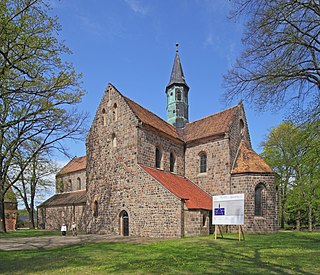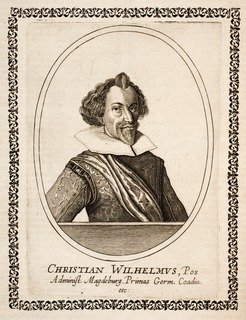
Torgau is a town on the banks of the Elbe in northwestern Saxony, Germany. It is the capital of the district Nordsachsen.

Jüterbog is a historic town in north-eastern Germany, in the Teltow-Fläming district of Brandenburg. It is on the Nuthe river at the northern slope of the Fläming hill range, about 65 km (40 mi) southwest of Berlin.

Luckenwalde is the capital of the Teltow-Fläming district in the German state of Brandenburg. It is situated on the Nuthe river north of the Fläming Heath, at the eastern rim of the Nuthe-Nieplitz Nature Park, about 50 km (31 mi) south of Berlin. The town area includes the villages of Frankenfelde and Kolzenburg.

Zinna Abbey is a former Cistercian monastery, the site of which is now occupied by a village also called Kloster Zinna, today part of Jüterbog in Brandenburg, Germany, about 60 km (37 mi) south of Berlin.

Zinna is a village and a former municipality in the district Nordsachsen, in Saxony, Germany. Since 1 January 2013, it is part of the town Torgau.
Vincenzo Zinna is a Swiss football player who last plays as a midfielder for FC Gossau in the Swiss Challenge League.
Rocco DiSiglio, also known as Rocky DiSiglio was an American professional welterweight boxer and associate of the Patriarca crime family who was involved in armed robbery and illegal gambling.
Zinna is a genus of moths of the family Erebidae. The genus was erected by Francis Walker in 1869.

Altenberg Abbey is a former Cistercian monastery in Altenberg, now a part of Odenthal in the Bergisches Land, North Rhine-Westphalia, Germany.
Gothic or Gothics may refer to:

Medieval letter tiles are one-letter ceramic tiles that were employed in monasteries and churches of the late Middle Ages for the creation of Christian inscriptions on floors and walls. They were created by pressing stamps bearing a reverse image into soft clay, which was then baked hard, and they were used to form words by assembling single-letter tiles in the desired order.
Bellone is a white Italian wine grape variety that wine historians believed was cultivated in Roman times. By 1990, nearly 3,000 hectares of the variety was still being cultivated and eligible to be blended in the wines of several Latium Denominazione di origine controllatas (DOCs). According to wine expert Jancis Robinson, Bellone produces a juicy white wine.
Mumuye is by far the most populous of the Adamawa languages. It is spoken in northeastern Nigeria. It is classified in the Leko–Nimbari branch of Savanna languages, as Adamawa is no longer considered a valid family. According to Ethnologue, there are multiple dialects: Zinna, Dong, Yoro, Lankaviri, Gola (Bajama), Gongla, Kasaa, Saawa, Jalingo, Nyaaja, Jeng, Gnoore, Yaa, Sagbee, Shaari, Kugong, Mang, Kwaji, Meeka, Yakoko.

Stalag IV-D was a German World War II prisoner-of-war camp located in the town of Torgau, Saxony, about 50 km (31 mi) north-east of Leipzig.

Christian Wilhelm of Brandenburg was a titular Margrave of Brandenburg, and from 1598 to 1631 Archbishop of Magdeburg.
The Forst Zinna rail disaster occurred 19 January 1988 in Forst Zinna, East Germany. A Soviet T-64 tank got stuck on the tracks and was hit by an express train. 6 were killed, 33 injured. It was one of the worst train accidents in the history of the GDR.
Werner Keller was a German civil servant, journalist, nonfiction author and anti-Nazi resistance fighter.
Riccardo Zinna was an Italian actor and musician.
This page is based on this
Wikipedia article Text is available under the
CC BY-SA 4.0 license; additional terms may apply.
Images, videos and audio are available under their respective licenses.








